When I see "F1" after the name of a plant, what does that mean?
Answer: An F1 variety is a plant variety created by crossing two distinct parents. The resulting F1 hybrid has certain characteristics of each parent. Typically the F1 designation is limited to vegetable varieties.
(Shown: The popular cherry tomato 'Super Sweet 100' is an example of an F1 hybrid.)
The advantage of F1 hybrid seed is that the plants grown from it are very predictable and uniform. They have been bred for specific characteristics, such as flavor, color, number of days to harvest, resistance to disease, etc. F1 hybrids also possess "hybrid vigor." Typically this means more plants survive the seedling stage and mature plants are large and healthy.
The disadvantage of F1 hybrids is that they while they may be strong in one aspect, they can be vulnerable in another. They are also usually sterile, meaning that they will not produce seed. You'll have to purchase seed every year if you want to keep growing that variety. Even if the variety is not sterile and does produce seed, the seed will be unstable—it won't necessarily produce plants with the same traits as the parent. F1 hybrids are more expensive than other varieties because of the additional costs associated with controlling pollination of the parent plants, and because they are sometimes trademarked/patented by the breeder, so the retailer must pay a royalty to sell the plant under the registered trademark name.
The alternative to F1 hybrids is open-pollinated varieties, also called heirloom varieties. These are plants that can self- or cross-pollinate. One advantage to these varieties is that you can collect their seed at the end of the season, start it the next year and expect the seedlings to resemble and behave like their parent. To ensure the purity of the variety, though, you may want to grow it in isolation to prevent it from cross-breeding with a neighbor of a different variety.
As far as taste, some gardeners swear heirloom varieties taste better than F1 hybrids. This is mostly a matter of opinion; there are varieties of both kinds that have remained popular for years.
Image attribution: Pluma. Image rights.
________________________________________________________
Design a vegetable garden that's both productive and pretty with Ornamental Vegetable Gardening.
Learn everything you need to know about vegetable gardening with Taunton's Complete Guide to Growing Vegetables and Herbs.
Make the most of your space by using raised beds. Learn how with Cubed Foot Gardening: Growing Vegetables in Raised, Intensive Beds.
Subscribe to our free weekly gardening e-newsletter and get a free gift.







